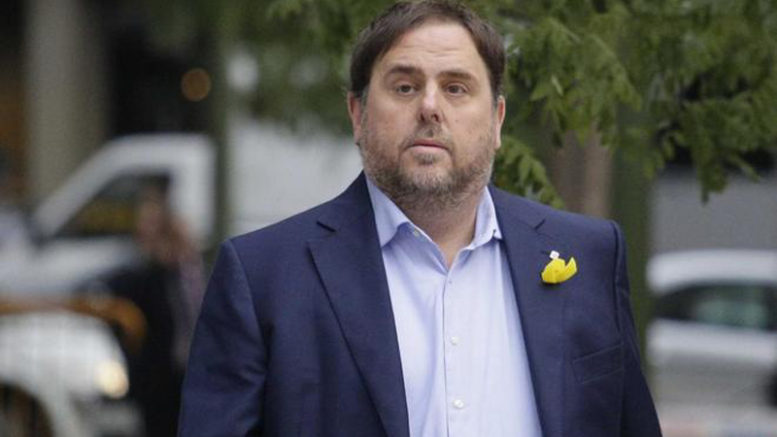Spanish prosecutors assigned to the nation’s Supreme Court system are sad to be considering requesting lesser sentences for leaders of Catalonia’s secessionist Independentista movement, once the Supreme Court closes the investigative phase of the case against the Catalans and sets a date for the opening of oral arguments in the trial.
 Spanish media reports say that once the trial date is set, a court decision that is expected as soon as this week, the government prosecutors will not likely seek the maximum sentence of 30-years imprisonment for any of the leaders of Catalonia’s independence movement currently jailed on the most serious charge of rebellion.
Spanish media reports say that once the trial date is set, a court decision that is expected as soon as this week, the government prosecutors will not likely seek the maximum sentence of 30-years imprisonment for any of the leaders of Catalonia’s independence movement currently jailed on the most serious charge of rebellion.
Former Catalan President Carles Puigdemont, Vice-President Oriol Junqueras and 27 other regional politicians and pro-independence activists face a variety of charges over their alleged roles in Catalonia’s unconstitutional October 2017 independence referendum and related events, including the Catalan parliament’s declaration of independence from Spain. Puigdemont and five others are currently fugitives from the Spanish justice system, having fled the country to avoid arrest after failing to respond to a summons to give testimony before the Supreme Court. Junqueras and eight others were considered a flight risk and have been held in preventive detention for a year, pending the opening of the oral arguments stage of the trial.
Instead of seeking the maximum allowable sentences, the news reports say, prosecutors will request that if guilty verdicts are returned the court determine sentences following a kind of ‘sliding scale’ of responsibility, depending on each individual’s role in the events around the independence referendum.
Under that scenario, prosecutors would seek prison terms and disqualification from holding public office for a period of 15-25 years for nearly all of those ultimately convicted of rebellion, rather than the maximum 25-30 years — the exception said to be Junqueras, leader of the Esquerra Republicana de Catalunya (ERC, Republican Left of Catalonia) party, who prosecutors believe was primarily responsible for the referendum and therefore deserving of the maximum penalty.
 Sentences of 10-15 years would be sought for those who played lesser roles in support of “rebellion”, with sentences of 5-10 years for those deemed to be carrying out instructions from superiors, yet still in disobedience of multiple court injunctions forbidding the independence referendum.
Sentences of 10-15 years would be sought for those who played lesser roles in support of “rebellion”, with sentences of 5-10 years for those deemed to be carrying out instructions from superiors, yet still in disobedience of multiple court injunctions forbidding the independence referendum.
The Supreme Court judges who will hear the case may set lighter sentences than those requested by prosecutors. Frequently in Spain, those convicted and jailed on even the most serious of crimes can actually serve fewer years than the sentence handed down to them.
The media leaks of prosecutors’ intentions come in the face of repeated demands from the leadership of the ERC and pro-independence allies in Puigdemont’s Partit Demòcrata Europeu Català (PDeCAT, Catalan European Democratic Party) that the secessionist leaders being held in preventive prison for the past year while awaiting trial be freed by the government, at least until the trial begins as anticipated early next year.
After hearing of the prosecutors’ apparent intention to seek reduced sentences, leaders of both the ERC and PDeCat said this week that they are sticking to their demands that the new Socialist government of President Pedro Sánchez direct prosecutors to drop charges or at least request that the court release the prisoners on bail until the start of oral arguments in the trial. If the Sánchez government does not comply, they say they will vote against the government’s national budget proposal for 2019, all but ensuring the government’s defeat when the budget comes up for consideration and approval by Congress as expected in November.
► Read More in Spanish at La Vanguardia, El Periódico and El Mundo …
► Click to read more news about Catalonia …
Check out more news from Spain about:
► Animal Welfare ► Corruption/Transparency ► Discrimination ► Education ► Environment & Sustainability ► Fair Trade & Development Aid ► Healthcare ► Historical Memory ► Housing & Homelessness ► Human Rights ► Labour & Unemployment ► LGBT ► Peace & War ► Politics ► Poverty ► Refugees & Migration ► Technology & Social Enterprise ► Women’s Rights

